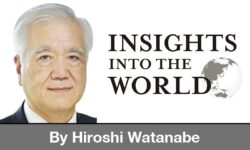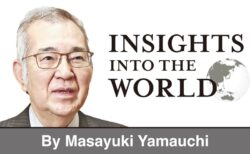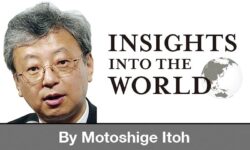20:14 JST, February 4, 2021
In Japan, we usually celebrate the start of every new year in a festive, joyful spirit, as it is a valuable time to turn over a new leaf. However, when we ushered in the year 2021, we were in distress, still stuck in an anxious situation day after day due to the novel coronavirus pandemic, with no exit in sight.
When we are faced with upheaval and the turmoil it brings, it is not easy to think calmly about how we should accept the situation or resist. But, exactly because of this situation, we should keep a close eye on how the world will change and think about what particular aspects of that change we should choose ourselves, instead of passively trying to adapt.
To respond to this necessity, a variety of predictions and discourses were published about the risk factors the world was likely to encounter in 2021. Nearly all of them cited risk factors such as COVID-19 vaccinations and their effect on how soon the pandemic will end; climate change; worse-than-expected political turmoil in the United States; China’s expansionist drive with little respect for the notion of national boundaries; and the future of U.S.-China tensions.
While the COVID-19 pandemic is the most difficult of difficult cases to tackle because it forces human beings to deal with invisible viruses, it also is difficult to forecast what will happen to the political landscape in Japan and elsewhere, even though their actors — human beings — can be seen. As in the common Japanese saying “darkness lies one inch ahead” it is more difficult to predict what will happen in the political sphere than in the economic one.
Despite this difficulty, we need to stay conscious of the mindset with which we face various risks. To prepare for and cope flexibly with hard-to-predict circumstances, it is critical to ensure free speech, which is the lifeblood of mental freedom in society, including the political sphere. From a long-term perspective, speech is the most fundamental element, and ultimately determines the vitality of the political and economic fabric of society.
However, there have been times recently when I felt that vitality has been waning because of the excessive exercise of “self-restraint” regarding speech. For example, although speech is a key tool in the political profession, there are almost no politicians who honestly say to our hearts, “This is what I think,” to let us know what they actually have in mind and what they want to pursue as their political ideals. As a result, politics in Japan have become more unintelligible to the public than before. A decline in “intelligibility” is never good for democracy.
It is noteworthy that some people in the United States have also expressed concern about the stifling, repressive atmosphere toward speech there. In July 2020, the website of U.S. opinion journal Harper’s Magazine carried “A Letter on Justice and Open Debate” that lamented the trend in which the U.S. norms of open debate and tolerance of differences are being weakened. The letter was signed by more than 150 prominent intellectuals with different political positions. They included figures who are well-known in Japan, such as linguist Noam Chomsky, writer Salman Rushdie and conservative political scientist Francis Fukuyama.
The following examples of constricting speech, cited in the letter, shed some light on the prevailing state of freedom of speech in the United States: “Editors are fired for running controversial pieces; books are withdrawn for alleged inauthenticity; journalists are barred from writing on certain topics; professors are investigated for quoting works of literature in class; a researcher is fired for circulating a peer-reviewed academic study; and the heads of organizations are ousted for what are sometimes just clumsy mistakes… the result has been to steadily narrow the boundaries of what can be said without the threat of reprisal.”
It may be a surprise that the United States has cases of intolerance reminiscent of witch hunts. But it is true that the United States saw the rampage of the insidious “red baiting” campaign in the early Cold War period. Of course, there was a similar ideological campaign in Japanese society. It is not rare in any country for repressive forces that reflect intolerance to implicitly or explicitly make themselves felt in politics. Populism, defined as a degraded form of democracy, generates pressure on people, whether they realize it or not, to “conform to group norms or otherwise become subject to accusations of misbehaving.”
It should be noted that “defenders of social justice,” for whom battling fascism is a golden rule, may turn out to be the greatest enemies of freedom. We must be on alert for a fascistic tendency toward despotic control under the guise of fighting for equality and justice. The open letter in Harper’s Magazine warned that any society in which people who are sensitive to the tyranny of a censorious majority opinion choose to exercise self-censorship will definitely lose its vitality.
Of course, the letter has not been fully accepted in U.S. society, which continues to struggle with serious racial discrimination and the issue of immigration. Some people have criticized the letter as sheer hypocrisy by elite intellectuals. Even so, the fact that some people have expressed such an opinion in disagreement is still worth praising as a sound development.
If there was anything we could learn from former U.S. President Donald Trump, it was his easy-to-understand way of delivering words and actions. As such, he stood in contrast to Japanese politicians who tend to frequently say, “I withhold comment.”
However, there was a fatal flaw in his “easy-to-understand” arguments. They were comprehensible but lacked thought, and he was unable to talk about political philosophy. People expected U.S. society to undergo major changes, and chanting the mantras of “America First” and “Make America Great Again” served to amplify the turmoil.
In Japan, as sovereign power resides with its people, we should endeavor to articulate the kind of Japanese society we want to have after the coronavirus pandemic is over. Considering the possibility that we could face a new virus at any time, it is no use to establish a goal of restoring our society to what it used to be prior to the COVID-19 pandemic after persevering for a year or two. When we think of the prodigious sacrifice our society has made in the past year, it is also meaningless to repeat stopgap measures to deal with inconvenient issues, including those that are happening right now in this nation.
Our society is undergoing a major structural transformation. For us to transit to a new form of society while repairing the Japanese economy and politics little by little as necessary, it is imperative to reflect on and make the most of what we have experienced in the past year. People are said to have found online meetings using virtual tools to be unexpectedly convenient for handling things that would otherwise have been physically done in offices, for instance. But at the same time, we have learned that it is impossible for the appliances of civilization to build and advance mutual understanding and collaboration by themselves. Our society is faced with a graying population with a declining birth rate and the energy issue, but these matters cannot be resolved with makeshift policies alone. In a nutshell, there can be no way other than exploring a new path for our society, through trial and error, by encouraging people to devise unfettered ideas and engage in free discussion.
Despite facing the unrelenting situation described above, not a few people seem to be endeavoring to use it as an opportunity to reconsider not only the way things are produced and consumed, but also the way they live. Free thinking and free speech are indispensable for such a review.
A social atmosphere that compels people to refrain from speaking out due to self-censorship will sap the vitality of economic activities, in which “animal spirits” are required, as economist John Maynard Keynes said, and the political arena, where decisive policy action is essential. Of course, those who engage in education and research are strictly advised not to be unnecessarily ambitious. That said, in order to overcome stagnation in the economy and politics, I think everyone in Japanese society should have the courage to come forward and say in an intelligible way: “I think this way” or “I want to do this.”
Top Articles in Editorial & Columns
-

Riku-Ryu Pair Wins Gold Medal: Their Strong Bond Leads to Major Comeback Victory
-

40 Million Foreign Visitors to Japan: Urgent Measures Should Be Implemented to Tackle Overtourism
-

China Provoked Takaichi into Risky Move of Dissolving House of Representatives, But It’s a Gamble She Just Might Win
-

University of Tokyo Professor Arrested: Serious Lack of Ethical Sense, Failure of Institutional Governance
-

Policy Measures on Foreign Nationals: How Should Stricter Regulations and Coexistence Be Balanced?
JN ACCESS RANKING
-

Japan PM Takaichi’s Cabinet Resigns en Masse
-

Japan Institute to Use Domestic Commercial Optical Lattice Clock to Set Japan Standard Time
-

Israeli Ambassador to Japan Speaks about Japan’s Role in the Reconstruction of Gaza
-

Man Infected with Measles Reportedly Dined at Restaurant in Tokyo Station
-

Videos Plagiarized, Reposted with False Subtitles Claiming ‘Ryukyu Belongs to China’; Anti-China False Information Also Posted in Japan
























